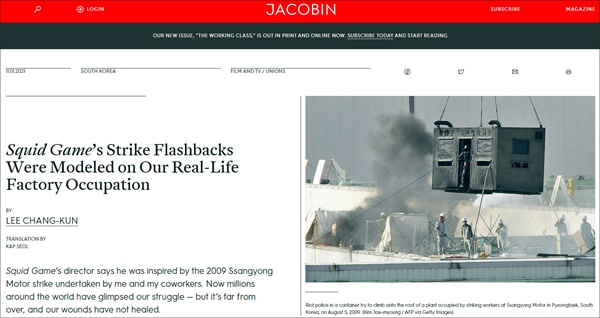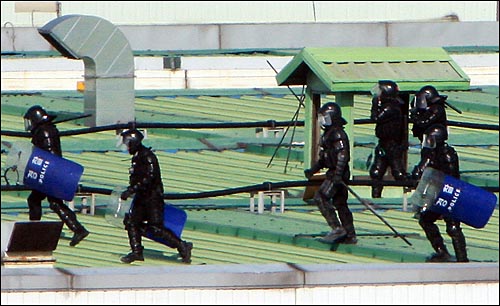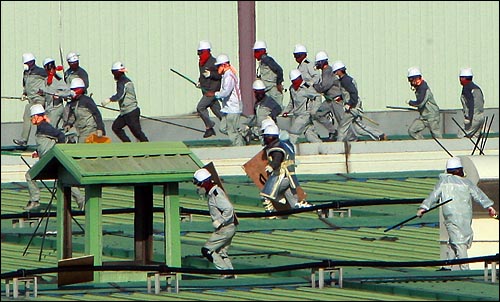큰사진보기

|
| ▲ 미국 좌파 온오프라인 잡지 ‘자코뱅’(Jacobin)이 1일 쌍용자동차 해고 노동자 이창근씨의 기고문 “Squid Game’s Strike Flashbacks Were Modeled on Our Real-Life Factory Occupation”(“오징어 게임의 파업 회상 장면은 우리의 실제 공장 점거 투쟁을 모델로 했다”)을 실었다. |
| ⓒ 자코뱅홈페이지화면캡처 | 관련사진보기 |
낮게 날고 있는 경찰 헬기가 강력한 소음으로 노동자들의 울부짖는 소리마저 앗아갔다. 얼마나 맞았을까. 공장 옥상에는 늘어진 오징어 마냥 노동자들이 쓰러져 있다.
쌍용자동차 해고 노동자 이창근씨의 기고문이 지난 1일 미국 좌파 온오프라인 잡지 <자코뱅(Jacobin)>에 실렸다. 기고문의 제목은 'Squid Game's Strike Flashbacks Were Modeled on Our Real-Life Factory Occupation(오징어 게임의 파업 회상 장면은 우리의 실제 공장 점거 투쟁을 모델로 했다)'이다.
넷플릭스 오리지널 드라마 <오징어 게임> 속 주인공 기훈(이정재 분)은 쌍용자동차를 연상시키는 '드래곤 모터스' 해고 노동자로 나온다. 파업 투쟁에 가담한 기훈의 눈앞에서 경찰특공대원들은 희뿌연 최루 연기 속에 힘없이 쓰러진 노동자들의 몸을 곤봉으로 내려치고, 발로 짓밟는다.
이창근씨가 기억하고 있는 2009년 8월 평택 쌍용차 공장 파업 현장은 더 참혹했다. 이씨는 "쫓기듯 도망치는 파업 노동자 머리 위로 경찰 곤봉이 쉴 새 없이 날아들었다. 쓰러진 노동자를 짓밟고 때리고 때린 뒤 또 때렸다"며 "마치 딱지치기라도 하듯 맞을 때마다 파업 노동자들은 앞뒤로 뒤집히듯 굴러다녔다"고 전했다.
정리해고를 막기 위해 벌인 이 파업으로 94명의 노동자가 구속되고, 230명이 불구속기소됐다. 파업 이후 30명이 넘는 해고 노동자와 가족이 목숨을 끊거나 사망했다.
큰사진보기

|
| ▲ 2009년 8월 5일 경찰과 사측의 쌍용자동차 2차 진압작전이 시작됐다. 경기도 평택 쌍용자동차 공장에서 경찰들이 조립 3,4팀 옥상을 장악해 노조원들을 뒤쫒고 있다. |
| ⓒ 유성호 | 관련사진보기 |
큰사진보기

|
| ▲ 2009년 8월 5일 경찰과 사측의 쌍용자동차 2차 진압작전으로 경찰이 조립 3,4팀 옥상을 장악하자 노조원들이 긴급히 후퇴하고 있다.
|
| ⓒ 유성호 | 관련사진보기 |
"서로를 죽여야 하는 오징어 게임과 너무나 닮았다"
당시 쌍용차 측은 5300명의 노동자 중 절반인 2646명에게 해고를 통보했다. 두 명의 노동자 중 한 명은 살인적인 해고를 당해야 하는 상황이었다. 이씨는 "노동자들이 뭉쳐서 저항하자 공권력까지 동원해 파업을 극단적 방향으로 몰아넣었다. 이때부터 노동자 내부도 갈라진다"며 "가장 가까운 사람이 결국 서로를 죽여야 하는 오징어 게임 속 장면과 너무나 닮았다"고 회상했다.
오징어 게임 속에 등장하는 게임의 순서가 어쩌면 쌍용차 해고 노동자들이 겪은 그 지긋지긋한 공장 점거 파업을 시간순으로 짠 것이 아닌가 할 정도로 유사성이 높다. 느닷없이 파업으로 내몰렸고 처음엔 손을 잡고 함께 살려 노력했지만 결국 네가 죽고 내가 살아야 하는 극단적 생존 경쟁은 서로를 배신하고 속이는 지경으로 몰아넣었다.
그러면서 이창근씨는 "드라마 인기가 한국 현실의 적극적 반영의 결과이긴 하더라도 빈익빈 부익부 사회로 강한 드라이브를 거는 한국 사회와 한국인에게 어떤 자극을 주고 있는지에 대해서는 매우 회의적"이라고 지적했다. 그는 "한국 사회의 부러진 부의 불평등은 이제 굳어질 대로 굳어진 것이 아닌가 하는 자괴감과 허무함마저 느낀다"며 "그런 측면에서 오징어 게임 속 등장인물은 그저 드라마적 소재로만 쓰고 버려지는 일회용에 가까운 대접을 받고 있다는 느낌"이라고 평가했다.
가령 쌍용차 해고자가 이 드라마 속 주인공인 점은 다들 이야기하지만, 그들이 파업했다는 이유로 현재 국가로부터 30억에 가까운 손해배상 가압류를 당하고 있다는 현실에 대해서는 서로서로 눈 감고 있는 현실 같은 것이 그것이다.
이창근씨는 "꿈을 꾸면 나타나는 지난 10년 전의 악몽은 시간이 많이 지났는데도 어찌 된 일인지 더 선명해지기만 한다"면서 "쌍용차 노동자들이 겪은 지난 공장 점거 파업의 기억이 한낮 정수리 위로 내리쬐는 태양 빛처럼 강렬하게 우리를 향해 고개를 들었다. 오징어 게임이 넷플릭스에서 열풍을 일으킬수록 우리는 왜 더 답답하기만 한가"라고 토로했다.
파업 투쟁으로 6개월간 옥고를 치른 이창근씨는 금속노조 쌍용차지부 대변인으로 활동하며 쌍용차 사태의 진실을 알려왔다. 2016년, 9년 만에 현장으로 복직해 노동자로 일하고 있다.
실제 드라마를 제작하면서 쌍용차 사태를 참고했다고 밝힌 <오징어 게임>의 황동혁 감독은 기자회견에서 "구조조정에 따른 대량 해고와 파업, 이어지는 소송과 복직 투쟁, 해고자 및 가족들의 극단적 선택까지 뉴스로 접하고 있었다"며 "중산층이던 평범한 노동자조차도 해고와 자영업의 실패로 가장 밑바닥까지 떨어질 수 있고, 누구에게나 일어날 수 있는 일이라는 걸 기훈을 통해 보여주고 싶었다"고 밝혔다.
이창근씨의 <자코뱅> 기고는 재미 언론인 설갑수씨의 제안으로 이뤄졌다. 설씨는 "오징어 게임의 본질을 가장 쉽고 생생하게 설명해 줄 수 있는 사람이 쌍용차 노조의 이창근이라고 생각했다"고 제안 배경을 설명했다. 그는 또 "한국자본주의의 비참함을 주제로 한 오징어 게임의 세계적 성공이 두 가지 이유로 불편했다"며 "먼저, 국내적으로 비참함에 대한 성찰 없이 오징어 게임의 성공만 좋아하는 '국뽕'이 불편했고, 국제적으로는 아무 말 잔치가 되어버린 평론과 가십의 홍수가 불편했다"고 말했다.
한편 올해로 창간 10년을 맞은 <자코뱅>은 웹사이트 한 달 평균 접속자가 300만 명을 넘을 정도로 인기가 많으며, 특히 영미권의 MZ세대에게 큰 호응을 얻고 있다.
다음은 설갑수씨가 이창근씨의 원고를 번역해 자코뱅에 전달한 기고 전문이다.
Squid Game's Strike Flashbacks Were Modeled on Our Real-Life Factory Occupation
BY LEE CHANG-KUN / TRANSLATION BY KAP SEOL
Amid August heatwaves, yellow tear-gas liquid cascaded down on us from the sky. Swooping police choppers whipped up wind sufficient to pull umbrellas from our feeble hands. Riot police scaled the factory fences like invading cockroaches. Armed police commands fired rubber bullets and stormed the rooftop of the factory from freight containers pulled up by giant cranes. They brandished their clubs over our heads as they chased us. Police were trampling us, beating us, and continuing to beat us even after we fell unconscious. We were flipping and tumbling like origami in the ddakji game that a mysterious recruiter used to attract contestants in Squid Game.
The ear-piercing noise of the swooping choppers drowned out our screams, depriving us of even the right to cry. For how long were we beaten? Workers fell on the rooftop like dried squids. Smoke from burning tires was billowing everywhere, thickening the air, like we were in a warzone. Outside the plant, families and supporters stomped in anger and frustration. They made ferocious, but vain, attempts to charge the police cordon until the line of human shields became a wailing wall.
Sharing or Halving
In August 2009, after the brutal suppression of the strike at my employer Ssangyong Motor, about ninety-four workers were jailed and 230 were prosecuted. To date, more than thirty workers and family members are dead by their own hands or from conditions related to the trauma they endured.
In June, Ssangyong workers had begun an occupation of the factory, which lasted seventy-seven days. Overnight, a seemingly fine automobile maker had filed for receivership. The Chinese parent, SAIC Motor, was a fly-by-night operation. Since acquiring Ssangyong in 2004, SAIC had reneged on its commitment to capital injection and instead pilfered core technology.
The South Korean government claimed they would protect us, but instead ran roughshod over us. The country's weak social safety net makes a layoff nearly a death sentence. If workers can't hang onto what they have, they will begin a vertical free fall. This is bankruptcy in its fullest sense, socially and financially.
Extreme fear of layoffs escalates the fierceness of workers' resistance — there is no alternative. At that time, Ssangyong had a total of 5,300 assembly workers, and exactly half, or 2,646 workers, received pink slips. One in every two! Kill or be killed!
At first, workers often talked about ways to share work and workweeks. We could all chip in to support coworkers who would face difficulty after losing their jobs. We believed we could stay alive as long as we could come together as one. But what capitalism wanted was not to see us sharing, but to halve us, literally.
When we came together and mounted a strike, the government intervened only to back us further into a corner by branding us lawbreakers. From that point on, a divide cracked us from within. We were pitted one against another, the laid-off versus the employed, the dead versus the living.
What were the criteria for the layoffs? We don't know. Did management seek dialogue with or consent from the labor union before the job cuts? No. It just slashed the workforce by half without any explanation.
The order of games in Squid Game resembles the phases of agony Ssangyong workers had to undergo — indeed, the plot appears to be inspired by the seventy-seven-day occupation.
Out of the blue, we were left with no option but to squat at the factory. We first attempted to turn to each other to survive together. However, we were thrown into a life-or-death situation, often with no other option but to betray and dupe each other. At least once, as in Squid Game, we each had to hurt our closest friends. By the time the police raided the strike, there were only about 700 of us left, and mistrust of our coworkers nearly outweighed our trust. This pains me.
Nonetheless, we stood against government brutality and never abandoned our principle of "stay alive by sticking together." This was why I felt thankful as I watched Gi-hun, the protagonist based on many aspects of our real lives, showing human dignity and demonstrating altruism. That was the least we did.
Tempest
Squid Game has created a tempest.
Its protagonist Gi-hun is portrayed as a worker laid off by Dragon Motor. Though the flashback sequence showing a strike modeled after ours was brief, the company name was an obvious reference to Ssangyong, which means "twin dragon" in Korean.
In South Korea, Squid Game is successful because it reflects the brutal reality of the country, and it has gained popularity overseas for similar reasons. But as someone who witnessed the Ssangyong strike and its aftermath, I am left feeling frustrated, even empty in the wake of Squid Game. Inequality in my country now appears solidified beyond the point of reversal, with the rich getting richer and the poor getting poorer, while the story of the Ssangyong workers is a disposable commodity in a Netflix show.
People in South Korea love Squid Game, but much of the country still turns a blind eye to the fact that ours is one of a few democracies in which the government can sue workers for damages in connection with industrial action. The Ssangyong workers who inspired Gi-hun still have liens on meager income and assets thanks to an injunction won in 2009 by the conservative government of Lee Myung-bak, a former Hyundai executive. The current government of Moon Jae-in, a former human rights lawyer, has not dropped the lawsuit, and is still seeking about 2.7 billion Korean won ($2.3 million) in damages, plus annual interest and daily penalties.
Once again, corporate vagaries are putting our fates at risk. In January 2021, Mahindra and Mahindra, the Indian conglomerate that bought Ssangyong in 2010, decided to sell its controlling stake, citing COVID-19-caused financial problems. About nine months earlier, Ssangyong was placed under court receivership after Mahindra and Mahindra could not get fresh loans from the Korea Development Bank, after it shelved a round of promised capital injection.
This month, Mahindra and Mahindra said it would sell Ssangyong to Edison Motors, a Korean electric vehicle startup. The new buyer looks more like a corporate raider than a venture firm. Edison is attempting a leveraged buyout: It has said it will put up Ssangyong's assets as collateral to get loans to buy it. The remaining jobs at Ssangyong are now on the line.
Unhealed
"Could I make a different choice if I could turn back time?" I wondered aloud to my wife on an evening walk. "There was no other possible decision," she said. "You did your best dealing with hard times. And that has inflicted sufficient pain on you." She added, "That's who we are. I know you want to deny it, but there was no other way." I nodded in agreement.
Heart-wrenching desperation, fear of death, and unending horrors often overcame me throughout the occupation. I still suffer from nightmares and flashbacks of the violence and division inflicted upon us more than ten years ago, with increasing clarity each time. I can't tell what steadily clarifies such images and memories, but the ever-brighter lucidity leaves me in deeper shadows.
Our scathed dignity and violated rights remain unhealed. Time alone cannot wash away our nightmarish memory. It still feels as if the hot midday sun beats down on our foreheads. The stronger the tempest of Squid Game blows, the more we feel stifled.